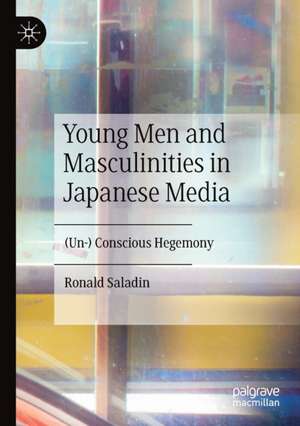Young Men and Masculinities in Japanese Media: (Un-) Conscious Hegemony
Autor Ronald Saladinen Limba Engleză Paperback – 6 ian 2021
| Toate formatele și edițiile | Preț | Express |
|---|---|---|
| Paperback (1) | 517.34 lei 6-8 săpt. | |
| Springer Nature Singapore – 6 ian 2021 | 517.34 lei 6-8 săpt. | |
| Hardback (1) | 521.35 lei 6-8 săpt. | |
| Springer Nature Singapore – 18 dec 2019 | 521.35 lei 6-8 săpt. |
Preț: 517.34 lei
Preț vechi: 608.63 lei
-15% Nou
Puncte Express: 776
Preț estimativ în valută:
99.04€ • 101.86$ • 82.16£
99.04€ • 101.86$ • 82.16£
Carte tipărită la comandă
Livrare economică 20 februarie-06 martie
Preluare comenzi: 021 569.72.76
Specificații
ISBN-13: 9789811398230
ISBN-10: 9811398232
Pagini: 266
Ilustrații: XIX, 266 p. 25 illus., 8 illus. in color.
Dimensiuni: 148 x 210 mm
Greutate: 0.38 kg
Ediția:1st ed. 2019
Editura: Springer Nature Singapore
Colecția Palgrave Macmillan
Locul publicării:Singapore, Singapore
ISBN-10: 9811398232
Pagini: 266
Ilustrații: XIX, 266 p. 25 illus., 8 illus. in color.
Dimensiuni: 148 x 210 mm
Greutate: 0.38 kg
Ediția:1st ed. 2019
Editura: Springer Nature Singapore
Colecția Palgrave Macmillan
Locul publicării:Singapore, Singapore
Cuprins
Introduction.- Theoretical Preface and Methodology.- Organizing Japan’s gender regime.- Male magazines on the rise – Development of the Japanese magazine market.- Renegotiating Japan’s everyday life and gender.- Be attractive, be gentle, be a man – Love, relationships, and partnerships.- You’ve got to do what a man’s got to do… or not? – Sexual intercourse.- Conclusion – Adjusting Gender and (Re)Constructing Hegemonic Masculinity.
Notă biografică
Ronald Saladin is Assistant Professor of Japanese Studies at the University of Trier, Germany. He has taught courses and conducted research on gender, media, and popular culture of Japan at the Universities of Trier, Cologne, and Vienna. He was also a Senior Research Fellow at the German Institute for Japanese Studies (DIJ) in Tokyo.
Textul de pe ultima copertă
This book provides an in-depth investigation of two Japanese men's magazines, ChokiChoki and Men's egg, analysed as representative examples of the genre of Japanese lifestyle magazines for young men. Employing both qualitative and quantitative content analysis, focusing on topics ranging from everyday life activities up to partnerships and sexuality, it examines how these magazines discursively renegotiate norms of Japanese masculinity. By scrutinizing the way these magazines convey ideas of gendered behavior within different contexts, the book demonstrates how Japanese lifestyle magazines discursively create new ideas of gender and masculinities in particular. It argues that hegemonic gender norms of Japan's society are both altered and reconstructed at the same time and that while altering parts of the gendered habitus in order to adjust to changing social circumstances and perceptions of gender, magazines (un)consciously reproduce core values of the hegemonic gender regime and thus revalidate them as legitimate. A key read for scholars and students of contemporary Japan, Japanese studies, gender studies, and anyone interested in Japanese popular culture and media, this book provides new insights into a segment of the Japanese media market that has received little scholarly attention.
Caracteristici
Investigates Japanese men's magazines and how they discursively renegotiate norms of Japanese masculinity Considers how gender is re-constructed in media discourses and how this is connected to socioeconomic developments of Japan Provides a new insight into a segment of the Japanese media market that has received little scholarly attention
